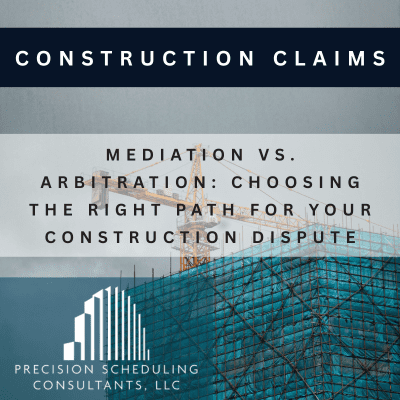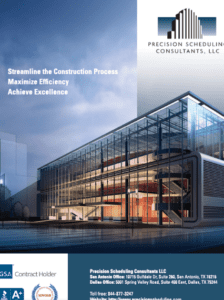Even the most well-planned projects can encounter construction claims. Misunderstandings, delays, design issues, or contract disagreements can quickly lead to costly disputes. When things go wrong, resolving conflicts quickly and effectively is critical to keeping the job—and your business—moving forward.
Two commonly used methods to settle these disputes without heading to court are mediation and arbitration. Understanding the pros and cons of each helps contractors and project owners choose the best approach based on their unique situation.
What Is Mediation?
Mediation brings both parties together with a neutral third party (a mediator) who facilitates discussion. The mediator doesn’t make decisions or take sides—instead, they guide conversations and help the parties work toward a mutually acceptable solution for their construction claim.
It’s especially helpful when the mediator understands construction-specific issues like schedule delays, design errors, or scope creep.
Why Mediation Works for Contractors and Owners in Construction Claims
- Fast and cost-effective: Most issues can be resolved in a matter of days—not weeks or months.
- Less formal: No strict courtroom rules. Everyone gets a chance to speak openly.
- Preserves relationships: Working together to solve the problem helps maintain trust—important when projects are still ongoing.
- Private process: Disputes stay behind closed doors, protecting reputations and sensitive information.
Potential Drawbacks
- Not always final: If no agreement is reached, you’re back to square one.
- Non-binding (unless formalized): Either party can walk away unless the agreement is put in writing.
- Uneven leverage: If one party holds more power (financially or contractually), the process can feel one-sided without a skilled mediator.
What Is Arbitration?
Arbitration is more structured—think of it as a private court. An arbitrator (or panel) hears both sides, reviews evidence, and then makes a decision. Unlike mediation, the arbitrator’s ruling is typically binding and enforceable, just like a court judgment over construction claims.
Why Arbitration Appeals to Construction Professionals
- Final and enforceable: The arbitrator’s decision is usually the end of the road.
- Faster than litigation: While more involved than mediation, it avoids drawn-out court proceedings.
- Tailored expertise: You can select an arbitrator with construction experience—critical when technical issues are at play.
- Some cost savings: Still cheaper than court battles, especially in complex cases.
Downsides to Keep in Mind when in a Construction Claim
- Costs can still rise: Arbitrators charge for their time, and legal and expert witness fees add up.
- Limited appeals: If the arbitrator gets it wrong, you may have no easy recourse.
- Not always confidential: Depending on the rules, details could become public.
- More adversarial: Unlike mediation, this process often feels like “us vs. them,” which can damage long-term business relationships.
Why Construction Forensic Experts Matter in Construction Claims
Whether you choose mediation or arbitration, forensic construction analysis can make or break your case. These experts dig into the details—like timelines, costs, communication logs, and change orders—to get a clear picture of what went wrong and when.
- In mediation, a well-prepared forensic report can help both sides understand the root of the issue and reach a fair compromise.
- In arbitration, that same report becomes evidence to back your claims or defend your actions.
In short, forensic analysis turns confusion and finger-pointing into facts—helping you resolve disputes with clarity and confidence.
Always review your contract first. Many agreements specify whether disputes must go through mediation or arbitration before going to court.
Choosing the Right Path: Key Considerations for Contractors & Owners in Construction Claims
Here are some real-world factors to help you decide:
1. Nature of the Dispute
- Negotiable or relational issues? Mediation might be ideal.
- Technical or legal violations? Arbitration may offer a more definitive resolution.
2. Current Relationship
- Still working together or want to avoid burning bridges? Mediation supports cooperation.
- Is the relationship already strained? Arbitration brings closure and finality.
3. Desired Outcome for Construction Claims
- Want a legally binding decision? Choose arbitration.
- Looking for flexibility and control over the outcome? Mediation offers that freedom.
4. Budget Constraints
- Mediation is typically more affordable.
- Arbitration costs more but can still be cheaper than court.
5. Urgency to Resolve Construction Claims
- Mediation is the fastest option—great if delays are impacting your schedule or cash flow.
6. Privacy Needs
- Mediation is strictly confidential.
- Arbitration may be less private depending on the provider and process.
Final Thoughts on Construction Claims: Strategy Over Stress
Construction disputes don’t have to derail your project or business relationships. Whether you’re a contractor facing an unexpected claim or a project owner addressing performance concerns, choosing the right resolution method is key.
- Mediation is ideal for preserving working relationships and solving problems quickly.
- Arbitration provides a structured path to a binding resolution when a firm decision is necessary.
Bring in a qualified construction attorney and forensic expert early in the process. Their guidance ensures you avoid costly mistakes and come out with a solution that protects your interests.


